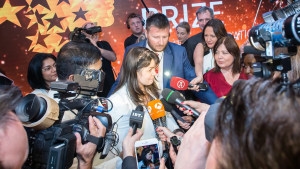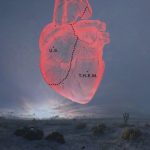How This Award-Winning Teacher Helped A Troubled Inuit Community Bounce Back
This past March, Maggie MacDonnell was awarded the $1 million Global Teacher Prize for her work with indigenous people in the Canadian Arctic. The Inuit village of Salluit, where she has taught for the past seven years, can only be reached by air, and temperatures often drop below -25C. With a population of 1,300, the community faced a rampant suicide crisis; six young men had taken their own lives in 2015.
During her time in Salluit, MacDonnell, 36, went from the heartbreak of attending funerals to being told by four people that she had saved their lives. Arriving as an outsider, the native Nova Scotian—who had previously spent five years working in sub-Saharan Africa on HIV/AIDS prevention programs—helped transform an entire community.
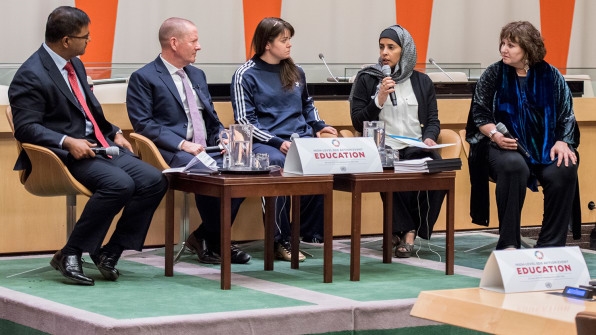
In addition to teaching kids ages 9-18, MacDonnell launched a number of transformative initiatives, including running a community kitchen, attending suicide prevention training, and hiking through national parks to understand environmental stewardship. She established a fitness center that helped build local teenagers’ physical and mental resilience against drugs, drinking, and self-harm. She has also been a foster parent, including to some of her own students. And those students, in turn, have fundraised more than $37,000 for diabetes prevention and other causes. MacDonnell credits these achievements to the power of education to connect people. To her, the secret to being the best teacher in the world is not much of a secret at all. It’s all about building relationships.
As she prepared to speak at the United Nations in New York earlier this month, we talked with MacDonnell via Skype about the prize and her vision for bringing people together in an increasingly divided world.
Fast Company: What did it feel like to be awarded such a big prize—and to have it announced from the International Space Station?
Maggie MacDonnell: I certainly never expected to be able to contribute so significantly that I’d be recognized on this global level. It’s still overwhelming. That million dollar prize is a spotlight, and I applaud the Varkey Foundation [the nonprofit organization that runs the Global Teacher Prize] for trying to raise the profile of teaching in the way they have. If you look at the research out there, the status of teachers is declining in every country except China, so we’ve got to try new things, because if we actually consider teachers to be exemplary, if we preach that the future is in their classrooms every day, why not award them the way we do celebrities or other role models in other professions?
FC: How do you plan to spend the prize money?
MM: The $1 million is a personal prize, but I’m up for investing it in empowering indigenous young people, especially those with whom I work, so I’m in the process of registering as a nonprofit. I will then put my million dollars towards a project based around kayaking. The Inuit actually invented the kayak, but that tradition is not quite so alive in the villages of the north, so I want to help reawaken that. I learned in Salluit that physical activity is an amazing tool for building resilience, and connecting young people to their culture and to their heritage is crucial for their pride and the health of the community. Thirdly, it connects them to the environment. So many indigenous youths have been disenfranchised from what I think is their greatest cultural heritage, which is that connection to the land.
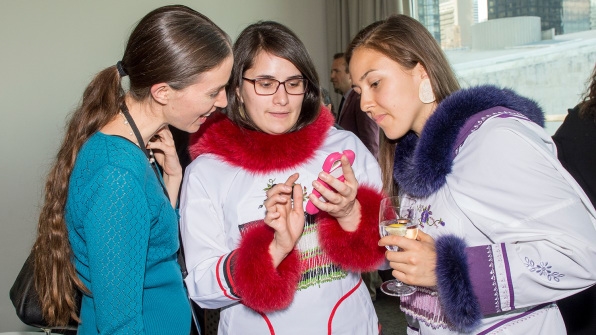
FC: Why is that connection so important?
MM: The Arctic is experiencing climate change at four times the rate of the rest of the world, and only two weeks ago, we lost a hunter in our region because the snow and ice are melting at rates and in ways which are unpredictable. So when we talk about the impact of this on indigenous people, it’s not just about land rights or environmental rights, it’s integral to human rights.
FC: You talk about disenfranchisement from the land and traditional culture. Is that a factor in the social problems communities like Salluit face?
MM: Absolutely. From residential schools to the tuberculosis outbreak, forced relocation, or the mass slaughter of sled dogs, there are huge legacy issues that continue to have an impact onto those indigenous populations. We use the term “intergenerational trauma” to describe this, and it’s something that young people carry with them every day into the classroom, even if they have not experienced it firsthand. But education is so powerful because it transcends all that. The Inuit have been so generous and forgiving, and they have tried again to trust an outsider like me. Despite those decades, if not centuries, of injustice and historical traumas, the beauty is that the human spirit can want to connect, and that we still can connect.
FC: Can education also help connect other groups that have been historically divided? How can teachers bridge the gap created by the current climate of political polarization we’re seeing across the globe?
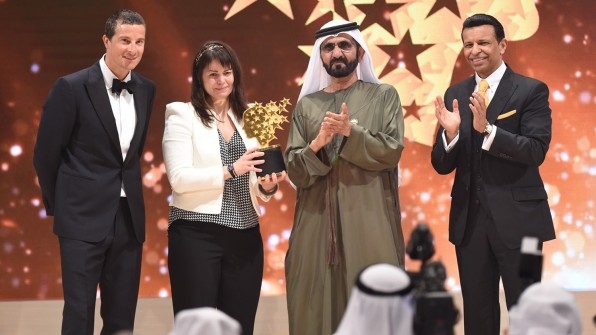
MM: I do agree with Sunny Varkey [the philanthropist who created the prize] when he said, “To every question that exists, education is ultimately the answer.” And teachers are our most underused, but also our most ideal, tools already out in the field to help us build those connections and relationships.
One of the biggest challenges and opportunities we have is promoting what I call “unlearning” and “re-learning,” especially in contexts where colonization has existed or there’s been a history of social injustice, because people have learned a lot of negative stereotypes, falsehoods, and partial truths. We can apply those lessons in all sorts of ways in terms of the continuing issues we have with gender, or some of the significant race issues we still face in 2017. So as teachers, we need to create a space where it’s safe for people to unlearn some things, and that might involve opening their eyes to their own privileges, which is uncomfortable for some people to go through. I try to always continue unlearning and re-learning myself—it’s one of the advantages of being a minority in that context, in spite of my privilege.
FC: Does technology fit into your teaching?
MM: Often, technology is not developed for worlds such as the one I live in. We have very slow internet in our school, so a lot of the engaging apps out there simply do not apply in my environment. But something I’m really excited about is the Varkey Teacher Ambassador Network, which includes the top 50 finalists for each year’s prize. Since it’s been going for three years, here is this phenomenal resource where there are 150 amazing teachers all over the world connected by this shared experience. One of them, Stephen Ritz from Benjamin Franklin Public School 55 in New York, works in an amazing project called Green Bronx Machine, which grows vegetables in vertical greenhouse towers. He’s sending me a few of those towers for us to try out in the Arctic. We face tremendous food insecurity in the north, so that’s great that it provides food, but it’s also about project-based learning, where you’re applying science and maths. It’s all about finding technology that’s appropriate to your reality.
FC: What’s next for you?
MM: I want to continue being a bridge between the public and indigenous people, helping them to connect through my kayaking project. Since winning the prize, I’ve already received all sorts of generous offers, and I’m hoping that people will match my million. I’ve setup a Facebook page to start building a community around that, so hopefully the project can grow in all sorts of exciting ways and become the start of something much bigger.
Maggie MacDonnell, winner of the Global Teacher Prize, explains how learning—and “unlearning”—can heal a divided society in a tiny Inuit village—and all over the world.
This past March, Maggie MacDonnell was awarded the $ 1 million Global Teacher Prize for her work with indigenous people in the Canadian Arctic. The Inuit village of Salluit, where she has taught for the past seven years, can only be reached by air, and temperatures often drop below -25C. With a population of 1,300, the community faced a rampant suicide crisis; six young men had taken their own lives in 2015.
Fast Company , Read Full Story
(50)

